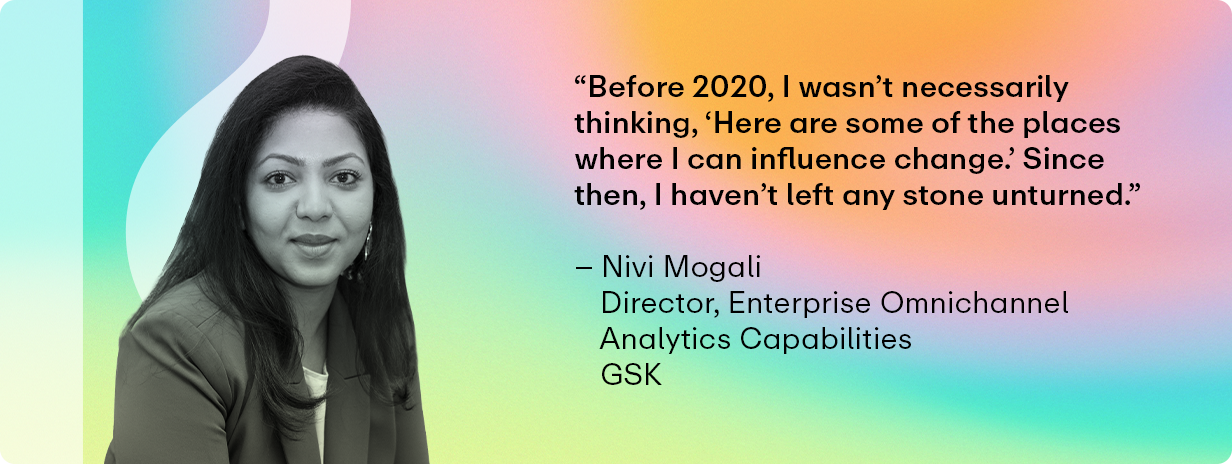Nivi Mogali was 13 years old when her maternal grandmother died of kidney failure. Nearly two decades later, her paternal grandfather and father-in-law succumbed to Covid-19—on the same day, no less.
Just as similar early-in-life experiences propelled others into careers in medicine and health-adjacent professions, so too did personal tragedy set Mogali on a distinct path. The first loss birthed in her a sense of purpose about the need to address limitations of the broader healthcare system. The second pair of losses, which occurred after Mogali had established herself as one of the brightest young minds in healthcare data and analytics, reaffirmed that commitment.
Her grandmother’s “absolutely preventable” death, which was linked to excessive administration of pain medication, cut deep. “Every time I talked to her on the phone, I’d ask her how she was feeling, and the answer was always, ‘I took some medication and I’m good,’” Mogali, now director, enterprise omnichannel analytics capabilities at GSK, recalls. “What none of us realized was how much she was taking. I don’t think she was empowered enough to understand the downside of that.”
Given Mogali’s young age at the time, the prospect of a career in healthcare—whether as a physician, scientist or engineer—was still far off. But Mogali knew that she wanted to pursue work that would ultimately spare others similar grief and pain.
“You don’t want the next generation to go through what you did. It never leaves you,” she says plainly.
Growing up in India, Mogali initially had designs on becoming a pilot or aeronautical engineer. Her grandfather worked in the aeronautical engineering space (“I remember him building instruments in the workshop in the yard of our house,” she says warmly) while her father worked in ground operations for an airline. Her first job out of school—Mogali graduated from Jawaharlal Nehru Technological University with a degree in instrumentation and control engineering and later received a Master’s degree in industrial engineering and management from Oklahoma State University—split the difference: She joined Infosys as a senior engineer, a role in which she counted a maker of airplanes among her clients.
Mogali spent only a year in her first full-time healthcare role, as an analyst at Medseek. The experience, however, offered a taste of what was to come later. On behalf of a hospital client, Mogali’s team dug into a trove of patient data and unearthed a list of individuals who, due to their comorbidities, might benefit from early screening. The individuals were then sent a mailer promoting a free event at the hospital.
Mogali’s predictive model proved eerily prescient when one of the attendees suffered a heart attack on the scene. “We found out after the fact that he came in via the marketing offer he received,” she says. “It showed the power of what we do. That one data point was literally life-saving.”
After a year at Medseek, Mogali returned to a more generalist role as an analytics supervisor in FCB’s Chicago office. Working with consumer goods clients proved eye-opening, less about their tactics and techniques than the tempo at which they were operating.
“In consumer goods, you get up-to-the-second data. You can generate an insight and push it to the customer right away,” she explains. “Pharma comes with valid challenges in terms of the carefulness that’s needed when processing patient and doctor information, but there’s a real lag with data. It’s frustrating to people who are used to a faster pace.”
Upon arriving at GSK in mid-2016, Mogali set about channeling that frustration. Her overarching goal was to create an analytics framework that would significantly speed up the generation of insights, then scale it across therapeutic areas and company teams. It didn’t take her long to understand that effecting such change would require a recalibration of her approach.
Mogali was brought in to work on an ongoing data-processing project that, per its longtime shepherds, took 45 days to pull together at the end of every quarter. She saw opportunities to bring that number down to two, and started to push forward with a plan to automate the process.
Her manager stepped in with advice that Mogali carries with her to this day. “She helped me realize that if we didn’t go about making the changes the right way, they wouldn’t be implemented,” she says. “The resistance was basically, ‘I’ve been here 20 years. How can you, who just got here, know better?’”
That experience cemented in Mogali a desire to educate people across GSK’s commercial operation about next-generation data and analytics processes that make it easier for them to do their jobs—and do them at a digital-era pace. “I get it. I mean, I like the phone I’ve had for 10 years and I don’t want a new one,” Mogali continues. “It’s so important to make sure that you bring people along with you.”
That, according to GSK director, strategic initiatives and competitive intelligence Gina Paola, has become one of Mogali’s hallmarks as a colleague and leader. “Nivi has a great talent of explaining extremely complicated analytics in an understandable way,” Paola says. “She’s a great advocate for her team and a clear communicator.”
These skills were put to the test during the harrowing early months of the pandemic. The first of Mogali’s two daughters was born just before the country went into lockdown, then her family was dealt the unthinkable blow of two Covid deaths on the same day. Mogali simultaneously found herself incredibly frustrated and intensely motivated.
Amid her grief and the chaos that comes with first-time parenthood, Mogali played a pivotal role in the launch of Xevudy (sotrovimab), GSK’s monoclonal antibody treatment for Covid. “It was easy to get lost in the realization that nobody had ever done something like this before, but I knew there had to be a starting point,” she recalls. “It was all about maintaining our usual rigor under extremely stressful conditions.”
Lessons from that harrowing stretch continue to resonate. “We didn’t just set a precedent in how an emergency product should be launched. We created an opportunity area for typical launches that we’d never thought about before.”
Looking back on her Covid-era experience five years later, Mogali acknowledges that its intensity had a major impact on her personal and professional lives. “Before 2020, I wasn’t necessarily thinking, ‘Here are some of the places where I can influence change.’ Since then, I haven’t left any stone unturned.”
That extends to Mogali’s mentorship of students aspiring to careers in health, science and engineering. This priority dates back to her time at Infosys, where she co-founded a program that brought single-day STEM camps to rural areas. Mogali continues to expand her slate of volunteer activity, serving in February as a judge for the Space Center Houston Conrad Challenge.
“I’ve had mentors who have pulled me up,” she says. “I want to pay that forward. I hope others will do the same for my kids when it’s their time.”
As for what comes next professionally, Mogali is equally keen on tackling immediate problems, especially those that create unneeded friction in the lives of patients and providers, and pondering larger, more involved ones. An in-demand speaker and panelist at industry events, she’s eager to preach the data and analytics gospel to audiences of all stripes.
“I spend a lot of time thinking, ‘Okay, five years from now, these are the capabilities we’re going to need. How are we going to get there?’” she says. “I’m very happy to be in a position to have that 30,000-foot view.”
Have you worked with a life sciences leader whose personal and professional story would make for an interesting Kinara profile? Drop us a note at hello@kinara.co, join the conversation on X (@KinaraBio) and subscribe on the website to receive Kinara content.




